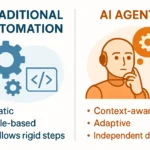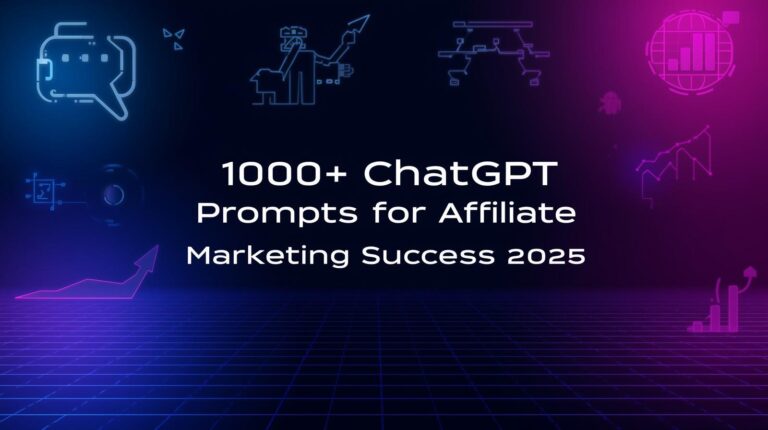The automation landscape is experiencing a seismic shift in 2025. While traditional automation has served businesses well for decades, a new paradigm is emerging that's fundamentally changing how we think about intelligent systems. AI agents are no longer just a futuristic concept—they're becoming the driving force behind the next wave of business transformation.
As someone who has witnessed the evolution of automation technologies firsthand, I can confidently say that 2025 marks a pivotal moment. The difference between AI agents and traditional automation isn't just technical—it's revolutionary. Where traditional systems follow rigid rules, AI agents think, adapt, and make decisions like digital employees.
This comprehensive guide explores why AI agents represent the breakthrough technology that's reshaping industries, from healthcare and finance to manufacturing and customer service. You'll discover the fundamental differences, real-world applications, and why forward-thinking businesses are making the switch now.
Understanding the Automation Evolution
What Is Traditional Automation?
Traditional automation has been the backbone of business efficiency for years. These systems excel at rule-based tasks, following predetermined workflows with clockwork precision. Think of them as highly efficient digital workers who never deviate from their instructions.
Key characteristics of traditional automation include:
- Static rule-based processing: Operates on “if-then” logic
- Predictable workflows: Handles routine, repetitive tasks
- Limited adaptability: Requires manual updates for changes
- Structured data dependency: Works best with organized, consistent inputs
Traditional automation thrives in environments like data entry, invoice processing, and basic customer service routing. It's reliable, cost-effective, and perfect for back-office operations that follow consistent patterns.
The Rise of AI Agents
AI agents represent a quantum leap forward in automation technology. Unlike their traditional counterparts, these systems possess what I call “digital intelligence”—the ability to perceive, reason, learn, and act autonomously.
What makes AI agents revolutionary:
- Goal-oriented behavior: Focus on achieving outcomes rather than following steps
- Contextual understanding: Process unstructured data and nuanced situations
- Continuous learning: Improve performance through experience
- Autonomous decision-making: Handle ambiguous scenarios without human intervention
The market reflects this paradigm shift—agentic AI adoption is expected to grow by 30% in 2025, driven by businesses seeking more sophisticated automation solutions that can handle complex, dynamic environments.
The Fundamental Differences: A Deep Dive
1. Decision-Making Capabilities
Traditional Automation:
Traditional systems are like sophisticated calculators—they execute predetermined formulas flawlessly but cannot think outside their programming. When faced with unexpected variables, they either fail or produce incorrect results.
For example, a traditional automation system processing customer returns might handle standard cases perfectly but freeze when encountering a return request with missing information or unusual circumstances.
AI Agents:
AI agents bring human-like reasoning to digital processes. They evaluate situations, consider multiple factors, and make informed decisions even when dealing with incomplete or ambiguous information.
Consider this real-world scenario: An AI agent handling customer service can understand that a frustrated customer using harsh language actually needs help with a billing issue, not just automated responses. It can adjust its communication style and escalate appropriately.
2. Learning and Adaptation
Traditional Automation:
These systems are essentially “set it and forget it” solutions—until something changes. Every modification requires developer intervention, making maintenance expensive and time-consuming.
I've seen companies spend thousands of hours updating traditional automation scripts after minor software updates or process changes. The rigidity that makes them reliable also makes them brittle.
AI Agents:
The self-learning capability of AI agents is perhaps their most transformative feature. They continuously refine their performance based on outcomes and feedback, becoming more effective over time without manual intervention.
A financial services company I consulted for deployed AI agents for fraud detection. Within six months, the system had learned to identify new fraud patterns that weren't in the original training data, catching sophisticated schemes that traditional rule-based systems missed entirely.
3. Handling Complexity and Context
Traditional Automation:
Traditional systems struggle with unstructured data and contextual nuances. They work well with forms, databases, and standardized inputs but fail when faced with emails, documents, or conversational interactions.
AI Agents:
AI agents excel at processing multiple data types simultaneously—text, images, voice, and structured data. They understand context, sentiment, and intent, making them ideal for customer-facing applications and complex decision-making scenarios.
Real-World Applications: Where AI Agents Shine
Healthcare Transformation
In healthcare, AI agents are revolutionizing patient care in ways traditional automation never could. Google's DeepMind Health project demonstrates this perfectly—their AI agents predict patient deterioration faster than current monitoring systems by analyzing complex combinations of vital signs, lab results, and clinical notes.
Traditional automation might flag individual metrics that exceed thresholds, but AI agents understand the subtle patterns that indicate a patient's condition is declining before obvious symptoms appear.
Key healthcare applications:
- Intelligent patient monitoring: Real-time analysis of multiple health indicators
- Automated diagnostic assistance: Processing medical images and patient histories
- Personalized treatment recommendations: Adapting protocols based on individual patient responses
Financial Services Revolution
The financial sector showcases some of the most impressive AI agent implementations. JPMorgan Chase's COIN platform uses AI agents to interpret complex commercial loan agreements—a task that previously consumed 360,000 hours of legal work annually.
Unlike traditional automation that might extract specific data fields, these AI agents understand legal language, identify risks, and flag unusual clauses that require human attention.
Financial services applications:
- Advanced fraud detection: Analyzing behavioral patterns across multiple channels
- Intelligent investment advice: Processing market data, news sentiment, and individual risk profiles
- Automated compliance monitoring: Understanding regulatory changes and their implications
Customer Service Excellence
AI agents have transformed customer service from reactive problem-solving to proactive relationship management. Companies like Bank of America with their Erica virtual assistant demonstrate how AI agents can handle complex, multi-turn conversations while maintaining context throughout extended interactions.
Traditional chatbots might answer specific questions well, but they fail when customers change topics or need help with interconnected issues. AI agents maintain conversation history and understand the broader context of customer needs.
The Business Impact: Measurable Results
Efficiency and Productivity Gains
Organizations implementing AI agents report significant productivity improvements beyond what traditional automation achieved:
- 24/7 autonomous operation: AI agents work continuously, identifying and resolving issues around the clock
- Reduced human intervention: Less manual maintenance and oversight required
- Scalable intelligence: Handle increasing complexity without proportional resource increases
Cost-Effectiveness Analysis
While traditional automation offers clear cost savings for routine tasks, AI agents deliver exponential returns in complex scenarios:
Traditional Automation ROI:
- Lower upfront costs for simple implementations
- Predictable savings through task elimination
- High maintenance costs when processes change
AI Agent ROI:
- Higher initial investment but faster payback periods
- Compound value increases through continuous learning
- Lower long-term maintenance costs due to adaptability
A manufacturing company case study I analyzed showed that while traditional automation reduced processing time by 40%, AI agents achieved 75% reduction while simultaneously improving quality control accuracy by 60%.
Strategic Competitive Advantage
The most significant impact isn't just operational—it's strategic. AI agents enable businesses to:
- Respond to market changes faster than competitors using traditional systems
- Deliver personalized experiences at scale that were previously impossible
- Make data-driven decisions in real-time without waiting for human analysis
Industry-Specific Transformation
Manufacturing and Industrial Applications
Smart factory implementations showcase AI agents' superiority over traditional automation. While traditional systems might stop production when sensors detect anomalies, AI agents predict maintenance needs, optimize production schedules, and adjust quality parameters in real-time.
NVIDIA's robotics platform announced in 2025 demonstrates this evolution—robots that don't just follow programming but understand their environment and adapt to unexpected situations.
Retail and E-Commerce Evolution
Amazon's recommendation system, powered by AI agents, generates 35% of the company's revenue by understanding customer behavior patterns that traditional rule-based systems couldn't capture.
Modern retail AI agents:
- Analyze customer sentiment from reviews, social media, and browsing behavior
- Optimize pricing dynamically based on competitor analysis and demand patterns
- Manage inventory proactively by predicting demand fluctuations
Cybersecurity Applications
The cybersecurity sector shows the clearest distinction between traditional and AI-powered approaches. Traditional security systems rely on signature-based detection—they catch known threats but miss new variants.
AI security agents deployed by companies like PayPal analyze behavioral patterns, network traffic, and transaction contexts to identify previously unknown threats. They've prevented millions in fraudulent transactions by detecting subtle patterns that rule-based systems missed.
Implementation Strategy: Making the Transition
When to Choose Traditional Automation
Traditional automation still has its place in the business ecosystem. It's ideal for:
- High-volume, low-complexity tasks with predictable inputs
- Compliance-heavy processes where exact rule following is critical
- Budget-conscious implementations where ROI requirements are short-term
- Stable environments where processes rarely change
When AI Agents Are Essential
AI agents become the obvious choice when you need:
- Dynamic decision-making in unpredictable environments
- Customer-facing interactions requiring empathy and understanding
- Complex data analysis involving multiple formats and sources
- Continuous improvement without manual intervention
Hybrid Approaches: Best of Both Worlds
Many successful implementations combine both technologies strategically. Traditional automation handles routine tasks while AI agents manage exceptions and complex scenarios.
A telecommunications company I worked with uses traditional automation for standard bill processing but deploys AI agents for customer disputes, billing anomalies, and service upgrade recommendations. This hybrid approach maximized efficiency while minimizing costs.
Future Outlook: The 2025 Breakthrough
Why 2025 Is the Tipping Point
Several factors converge to make 2025 the breakthrough year for AI agents:
Technology Maturation:
- Large Language Models have reached production-ready sophistication
- Computing costs have decreased enough to make AI agents economically viable
- Integration platforms simplify deployment without extensive technical expertise
Business Readiness:
- Digital transformation initiatives have prepared infrastructure for advanced automation
- Workforce adaptation to AI collaboration reduces change management barriers
- Competitive pressure forces adoption to maintain market position
Regulatory Clarity:
- AI Act compliance frameworks provide clear guidelines for responsible deployment
- Industry standards emerge for AI agent quality and reliability
- Trust mechanisms enable broader organizational adoption
Market Projections
Industry analysts predict that AI agent adoption will grow by 30% in 2025, with the following trends:
- Enterprise software companies integrating AI agent capabilities as standard features
- Small and medium businesses accessing AI agents through cloud platforms
- Industry-specific solutions emerging for specialized applications
- Multi-agent systems becoming common for complex organizational processes
Implementation Best Practices
Starting Your AI Agent Journey
Based on my experience guiding organizations through this transition, here's a practical roadmap:
Phase 1: Assessment and Planning (Months 1-2)
- Identify high-impact use cases where AI agents can deliver immediate value
- Evaluate existing infrastructure for AI agent integration requirements
- Develop success metrics that go beyond simple cost reduction
Phase 2: Pilot Implementation (Months 3-4)
- Start with customer service or data analysis applications for quick wins
- Choose reliable platforms with proven track records in your industry
- Train your team on AI agent management and optimization
Phase 3: Scaling and Optimization (Months 5-12)
- Expand successful use cases to additional departments or processes
- Integrate with existing systems for seamless workflow enhancement
- Continuously monitor and refine agent performance and business impact
Common Implementation Pitfalls
Avoid these mistakes I've seen organizations make:
- Trying to replace everything at once instead of strategic, phased implementation
- Underestimating change management requirements for workforce adaptation
- Focusing solely on cost reduction rather than value creation opportunities
- Neglecting data quality which is crucial for AI agent effectiveness
Measuring Success: KPIs That Matter
Traditional Automation Metrics
Traditional automation success is typically measured by:
- Task completion rates and processing speed
- Error reduction percentages compared to manual processes
- Direct cost savings from labor reduction
- System uptime and reliability metrics
AI Agent Success Indicators
AI agents require more sophisticated measurement approaches:
Quantitative Metrics:
- Decision accuracy improvement over time
- Customer satisfaction scores in agent-handled interactions
- Revenue impact from AI-driven recommendations
- Time-to-resolution for complex issues
Qualitative Indicators:
- Adaptability demonstrated when facing new scenarios
- Learning progression evidenced by improved outcomes
- User adoption rates by employees and customers
- Strategic value creation beyond operational efficiency
Overcoming Implementation Challenges
Technical Challenges
Data Integration Complexity:
AI agents require access to diverse data sources. Organizations often struggle with data silos, inconsistent formats, and legacy system compatibility.
Solution: Implement a data integration platform that can normalize and structure information from multiple sources before feeding it to AI agents.
Performance Optimization:
Unlike traditional automation with predictable resource requirements, AI agents' computational needs vary based on task complexity.
Solution: Use cloud-based AI platforms that automatically scale resources based on demand, ensuring optimal performance without over-provisioning.
Organizational Challenges
Change Management:
Employees often resist AI agent implementation due to job security concerns or skepticism about AI capabilities.
Solution: Focus on AI agents as tools that augment human capabilities rather than replacements. Provide comprehensive training and clear communication about new role definitions.
Trust and Adoption:
Building confidence in AI agent decision-making requires time and demonstrated reliability.
Solution: Start with low-risk applications, maintain human oversight initially, and gradually expand AI agent autonomy as confidence builds.
The Competitive Landscape
Market Leaders and Innovations
Technology Providers:
- Salesforce AgentForce: Leading enterprise AI agent platform
- Microsoft Copilot: Integration across productivity and business applications
- Google Cloud AI: Comprehensive AI agent development and deployment tools
- IBM Watson: Industry-specific AI agent solutions
Industry Disruptors:
- Emerging startups focusing on specialized AI agent applications
- Traditional automation companies pivoting to AI agent platforms
- Industry-specific solutions for healthcare, finance, and manufacturing
Investment and Market Growth
Venture Capital Interest:
AI agent companies raised over $4.2 billion in 2024, with investment accelerating in early 2025. This funding fuels rapid innovation and market expansion.
Enterprise Adoption:
85% of Fortune 500 companies have AI agent pilot programs planned or underway for 2025, according to recent surveys.
Market Size Projections:
The AI agent market is projected to reach $25.6 billion by 2027, representing a compound annual growth rate of 47% from 2025 levels.
Security and Ethical Considerations
AI Agent Security
AI agents introduce new security considerations beyond traditional automation:
Data Privacy:
AI agents process more sensitive information and make autonomous decisions that could impact privacy.
Decision Transparency:
Unlike traditional automation with clear rule trails, AI agent decision-making can be complex and require explainability frameworks.
Adversarial Attacks:
Sophisticated attackers might try to manipulate AI agents through data poisoning or prompt injection attacks.
Ethical AI Implementation
Bias Prevention:
AI agents can perpetuate or amplify biases present in training data, requiring careful monitoring and correction mechanisms.
Accountability Frameworks:
Organizations need clear policies for AI agent decisions, especially in areas affecting customers or employees.
Human Oversight:
Maintaining appropriate human control and intervention capabilities while leveraging AI agent autonomy.
Conclusion: Embracing the AI Agent Revolution
The transition from traditional automation to AI agents represents more than a technological upgrade—it's a fundamental shift in how businesses operate, compete, and create value. As we've explored throughout this comprehensive analysis, 2025 marks the breakthrough year when AI agents move from experimental technology to essential business infrastructure.
The evidence is overwhelming:
- 30% growth in AI agent adoption expected in 2025
- Proven ROI across industries from healthcare to finance
- Technological maturity that makes implementation accessible
- Competitive necessity for maintaining market position
For forward-thinking organizations, the question isn't whether to implement AI agents, but how quickly they can begin the transformation. Traditional automation will continue to play a role, but AI agents represent the future of intelligent business operations.
The time to act is now. Companies that delay AI agent adoption risk falling behind competitors who are already leveraging these technologies for superior customer experiences, operational efficiency, and strategic advantage.
Start your AI agent journey today by identifying high-impact use cases, evaluating implementation platforms, and developing a phased rollout strategy. The breakthrough year of 2025 offers unprecedented opportunities for organizations ready to embrace the future of intelligent automation.
The revolution is here. Are you ready to lead it?
Ready to explore AI agent implementation for your organization? Download our free AI Agent Readiness Assessment to identify your highest-impact opportunities and develop a strategic implementation roadmap tailored to your business needs.









